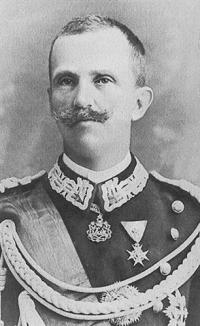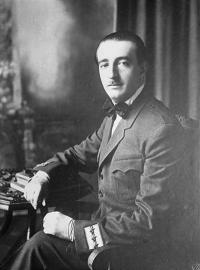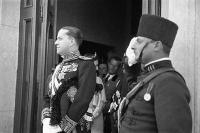
Vittorio Emanuele II of Italy

Ahmet Muhtar Bey Zog, King of Albania, Italy & Emperor of Ethiopia.

Count Ciano at King Zog's wedding.
This month, 70 years ago, King Victor Emmanuel III of Italy added the Crown of Albania to his possessions.
Other than a couple of decades in the 15th Century, Albania had never existed as an independent country until 1912, when it gained its independence from the Ottoman Empire. At the time of the Italian invasion, Albania was a constitutional monarchy with a strong monarch. The monarch was Ahmet Muhtar Bey Zog. He had changed his name to Zog from the Turkish Zogolli, after he had come to power in 1925, first as president, and then in 1928 with his coronation as King and appointment as Field Marshal of the Royal Albanian Army. During his rule he improved the educational system, the economy and the army. However, the Depression hit Albania particularly hard, allowing the Italians to strengthen their ties with the country.
The Italians were pushing toward a closer relationship with Albania than the King really wished. By the First and Second Treaties of Tirana, executed in 1926 and 1927, the countries agreed to a defensive alliance. The Albanian army was trained by Italians and Italians were encouraged to come to Albania to live.
In April 1938, the King married Countess Geraldine Apponyi de Nagy-Apponyi and it looked as if an heir was going to be produced, giving Albania more stability and independence from Italy. The Italian government decided to move. Besides, the Kingdom of Italy was the senior partner in the Rome/Berlin Axis and the junior partner was overshadowing it by gobbling up, first Austria in the Anchluss, and then the Sudetenland, in Czechoslovakia, as a result of the Munich Conference, and finally in March of 1939 establishing a protectorate over the Czech provinces of Bohemia and Moravia. By then, it was also obvious that King Zog and his new bride were going to produce an heir to the Albanian throne. Crown Prince Leka was born two days before the Italian invasion.
Il Duce felt that it was time for the senior partner of the Rome-Berlin Axis to assert itself. This was the first piece of Mussolini’s dream of recreating the Roman Empire. Italian King Victor Emanuel III added the title “King of Albania” to his other titles of “King of Italy” and “Emperor of Ethiopia.” In addition, he and Mussolini had become “Marshals of the Empire,” a year earlier.
On March 25, 1939, a note was delivered to Albania, demanding that the Italian Army be allowed to occupy the country. When King Zog refused the Italian offer of payment, Il Duce, on April 7, sent the Italian soldiers across the Adriatic Sea, even though, the day before, the Italians had assured the British they were not considering such a move. The invaders, under the command of World War I veteran General Alfredo Guzzoni, were divided into three groups which landed in successive waves. The most important was the first wave which was divided into four columns with each assigned a port and inland objective. The first column was commanded by Col. Arturo Scattini, and targeted Scutari.
The invaders encountered the most resistance at Albania’s second largest city and largest port, Durres. It was easily overcome. That force was commanded by General Giovanni Messe and targeted the capital of Tirana. The third column was commanded by Col. Bernardi and landed at Valona, with a target of Fieri. Colonel Carasi commanded the fourth column which landed at Quaranta, before moving to its target of Argirocastro. According to many, General Messe would prove to be one of the best Italian commanders, who would achieve the rank of Marshal the day before surrendering all remaining Axis troops in North Africa, on May 13, 1943, taking Arturo Scattini, who had been promoted to Lt. General, and 250,000 other Axis soldiers into captivity with him.
The Italians justified their attack because, “Influential persons in Albania had requested Italian Intervention on account of the unbearable situation created by King Zog.” Saying to his wife, “Oh God, it was so short,” the King fled to Greece. Arriving at the Royal Palace a day after the invasion, only to find that the Royal Family had fled, Count Ciano exclaimed, “The cub has escaped!” The Royal Family was reunited in France, where they lived until the German invasion, when they relocated to England.
Five days after the invasion, Shefqet Bej Verlaci, a political enemy of King Zog, who had been living, in exile, in Italy for several years, became Albanian Prime Minister. Since the Albanian royal family had fled to France, the Albanian Parliament “offered” the crown to King Victor Emanuel III, which he, of course, accepted, in a ceremony held in Quirinal Palace, in Rome. Verlaci was succeeded, as Prime Minister, by Mustafa Merlika Kruja, in December 1941.
A program of “Italianization” followed the invasion. The use of the Albanian language was discouraged and Italian was taught in the schools. Colonization of Albania by Italians was encouraged. The Albanian Fascist Party became the ruling party. Ironically, after the invasion and dismemberment of the Kingdom of Yugoslavia, an Albanian dream of uniting all ethnic Albanians in one country came close to realization when much of the Yugoslavian province of Kosovo, which was inhabited, primarily by Albanians, was joined with Albania. Parts of Montenegro and Macedonia were also annexed. After the German conquest of Greece, the Albanians were given the portion of that country, which contained a significant population of Albanians, to administer.
The Albanian military was placed under Italian command, and in 1940, merged into the Italian Armed forces. The Italian Fascist Blackshirts formed four legions of Albanian Militia. Originally, only Italians were recruited into the legions, but later, Albanians were recruited as well.
Albania served as the springboard from which the Italian invasion of Greece was launched, in October 1940. Although Albanian soldiers participated, they deserted in droves, once the fighting began, even though Albania had a stake in the outcome. Since the dissolution of the Ottoman Empire, Greece and Albania had been squabbling over the border territory known as Chameria.
After the initial Italian thrust, the Greeks rallied, counterattacked, drove the Italians out of Greece and occupied most of Albanian Chameria, including the Albanian port of Sarandë, which had been renamed “Porto Edda,” in honor of Mussolini’s eldest daughter, and wife of the Italian Foreign Minister, Count Galeazzo Ciano. With several months of Italian futility, and the arrival of British forces putting the Romanian oilfields from which Germany derived much of its oil, within reach of British bombers based in Athens, the German Wehrmacht arrived to aid its Italian ally.
After the surrender of the Kingdom of Italy, and the abdication by King Victor Emmanuel III of the Albanian throne, in September 1943, the Germans arrived. They immediately established an Albanian government and began recruiting for the 21st SS Division Skanderbeg. It was named after the Albanian national hero Gjergj Kastrioti Skanderbeg, who, in the 15th Century, had achieved, for his country, the only two decades of independence Albania had enjoyed until 1912. The division was disbanded, after eight months, as a failure.
Meanwhile, as in Yugoslavia, the Germans were engaged in a bitter struggle with the partisans. The Communist partisans were led by Enver Hoxa, who would rule postwar Albania until his death on April 11, 1985. By November 1944, the Germans had withdrawn from Albania.
Albania is unique, because it is the only European nation, occupied by the Axis, that finished the war with a higher Jewish population than it began. It is also the only country not to need the assistance of outside forces for liberation from the Axis grip. Of course, the advance of the Red Army, with the concomitant threat that any German troops that stayed would be isolated from the Fatherland, provided heavy impetus for their withdrawal.
Mr. Wimbrow writes from Ocean City, Maryland, where he practices law representing those persons accused of criminal and traffic offenses, and those persons who have suffered a personal injury through no fault of their own.
«Go back to the previous page.


